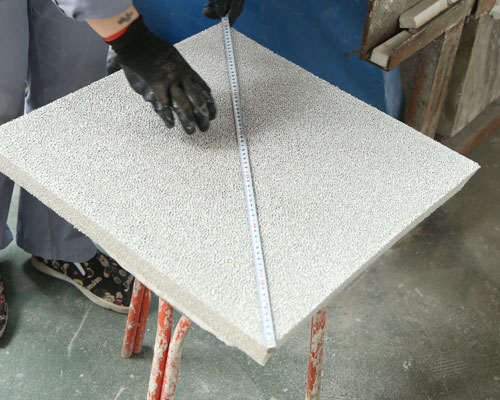Liquid aluminum ceramic foam filter is the most widely used in the field of filtration of molten aluminum. The advantage is high porosity, high filtration efficiency, ease of replacement, low cost, manufacturability; it is also possible to isolate part of the liquid inclusions by filtration of solid inclusions; The disadvantage of high-temperature strength is the low, short-lived (mostly disposable) filtration of a small amount.
Ceramic foam filter for liquid aluminum, including 80% due to the presence of flocculent particles of Al2O3, MgO, Al2MgO4.
Inclusion formation and ingredients, lining and gutter material, flue gas composition, purification and casting technology and others related.
The presence of a small number of small inclusions can play a lower degree of crystallinity during supercooling and promote nucleation. But the intensity of the excessive presence of inclusions in ingots or products, ductility, corrosion resistance, anodic oxidation and appearance negatively affect the quality.
At the same time, the inclusion of parasitic gases (mainly hydrogen) will lead to the formation of pinholes in products, delamination, cracks and other defects. Thus, refining is a key process in aluminum and aluminum smelting.

The conventional method of molten aluminum filtration, the filter is close to the completion of the last cleaning process of the casting.
Prior to this, after refining flux in the furnace, standing, medium and adsorption without medium, although 60% to 80% of inclusions and gas have already been removed, but the melt was still dispersed with finer (grain diameter usually <15 μm) (including inclusions of secondary raw material in the chute and intermediate production contract).
To obtain high quality aluminum products, we must ensure that these small inclusions are collected and separated by adsorption.
Compared to other purification methods, the filtration method has become the preferred method for the final purification of molten aluminum due to its low energy consumption, ease of operation, high purification efficiency, and less secondary pollution. Filtration is a necessary step to optimize metal quality and downstream finished products.
Glass cloth and mesh filter mainly due to the mechanical separation of inclusions, simple structure, low cost, suitable for inclusion, filters out large particles, but the inclusion of microfiltration has little effect, combined with a low heat capacity filter, the service life is short, the filter is unstable, it can only be used once, it is mainly used for pre-filtration of the melt.
Ceramic foam filters (CFF) have been widely used for filtering impurities out of molten aluminium in cast houses. Ceramic foam filters offer a simple, reliable and cost-effective method to remove inclusions. Filtering with CFF is a supplement to metal treatment within the furnace.

